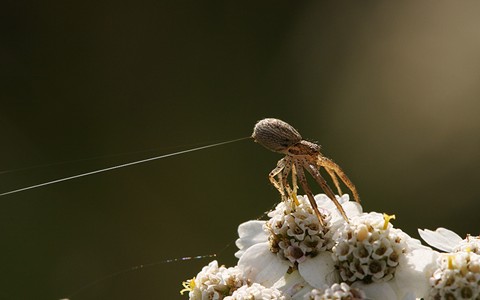
One of our favorite barroom debates concerns which animal will become the planet’s dominant species once a comet, asteroid, or accidental release of sinister nanobots makes human civilization go the way of the Zastava Koral. The smart money’s usually on the cockroach, due to its alleged ability to survive a nuclear Armageddon. And no one has ever gone broke by betting on the resilience of Rattus rattus, a species that has certainly proven itself an aggressive populator of barren landscapes.
But don’t sleep on spiders, which accomplished the seemingly impossible some 127 years ago by re-establishing themselves on the Indonesian island of Rakata after the cataclysmic eruption of Krakatau. In a land of nothing but ash and heat, arachnids staked their claim:
The first search for life on Rakata was conducted by a French expedition in May 1884, nine months after the explosions. The main cliff was eroding rapidly, and rocks still rolled down the sides incessantly, stirring clouds of dust and emitting a continuous noise “like the rattling of distant musketry.” Some of the stone whirled through the air, ricocheting down the sides of the ravines and splashing into the sea. What appeared to be mist in the distance turned close up into clouds of dust stirred by the falling debris. The crew and expedition members eventually found a safe landing site and fanned out to learn what they could. After searching for organisms in particular, the ship’s naturalist wrote that “notwithstanding all of my researches, I was not able to observe any symptom of animal life. I only discovered one microscopic spider—only one; this strange pioneer of the renovation was busy spinning its web.”
So how did this arachnid pilgrim make it to Rakata? It’s all about ballooning; video here.
(Image via Four Feet and More)


hubcap // Feb 2, 2010 at 5:41 pm
I thought one counter-argument against the cockroach and the rat is that their ubiquity is largely a function of our ubiquity. They are adapted to thrive around people and our garbage. Remove us and they would be much less successful.
I guess those bastard Alaska rats haven’t heard the counter-arguments.
Brendan I. Koerner // Feb 3, 2010 at 9:21 am
@hubcap: Rats really do have a genius for survival despite the circumstances. They’ll eat just about anything, and they’re expert breeders. That said, they do share our mammalian sensitivity to radiation; if the nukes do rain down, I’d put my money on the roaches before the rats.